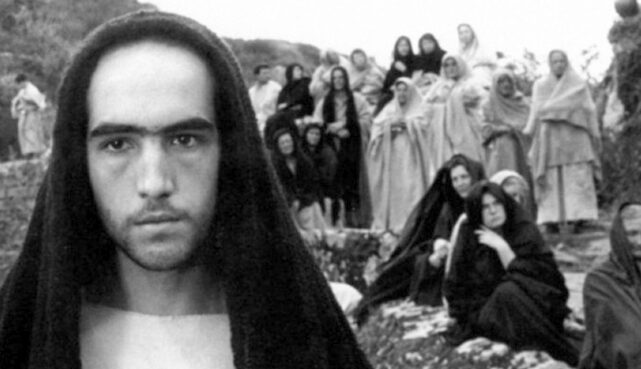There have been countless cinematic interpretations of thebooks of the Bible, but few have stood the test of time. One that qualifies as a classic is Pier Paolo Pasolini’s 1964 “Il Vangolo Secondo Matteo” (The Gospel According to St. Matthew).
Considered by the Vatican to be among the best film adaptations of one of the Gospels, Pasolini’s 1964 film was shot in the regions of Calabria, Puglia and Basilicata. In an interview with RAI television while on location in Matera, Pasolini talked about the reasons for shooting there. “I chose two or three places in Basilicata. One is Barile, a town of Albanians. I needed a place for Bethlehem. Another location is Matera because it reminded me of Jerusalem,” he explained.
Pasolini’s interpretation of St. Matthews’s Gospel is pure, with no added commentary. He said that he followed the Gospel word for word without adding a single syllable. He explained in the interview that his idea to make the film happened by coincidence. “In October of 1962, I was in Assisi exactly the day when Pope John XXIII arrived in Assisi. All of the events and confusion surrounding the Pope’s visit caused a traffic jam. So, I was forced to stay at home with my guests who belong to the Pro Civitate Christiana of Assisi. Held up inside with nothing to do, I picked up the Bible on the table and started reading. I began with St. Matthew because it was the first, and then came the trauma of the story. Then I read the others but the intense trauma that gave me the idea for the film came from St. Matthew. So I stayed loyal to that first feeling of inspiration.”
Spanish actor Enrique Irazoqui was cast in the role of Jesus. He was just 18-years-old when he landed the part. He had been in Rome at the time of casting. Acquaintances arranged a meeting between him and Pasolini. When Pasolini saw Irazoqui, he knew right away that he had found his Christ.
I had the opportunity to interview Irazoqui just a few months before he passed away in 2019. We talked via Skype. His recollections were tender and nostalgic. He spoke with great enthusiasm and a touch of humor as he described this unforgettable, life-changing experience.
FRA NOI: What stands out in your memory of working on this iconic film and specifically, shooting in the Sassi of Matera?
ENRIQUE IRAZOQUI: Matera became Jerusalem. We spent about a week to 10 days shooting there. In the Sassi of Matera, I experienced a bit of irony on the set because when we were filming, every 10 or 15 minutes of every day, seeing that I was dressed as Christ, wearing the clothes of Christ, certain men and women, when I was talking with the apostles, asked me if I could perform a miracle for them. I didn’t know how to perform miracles. I said, ‘I am not Christ. I am an actor that is portraying Christ.’ They didn’t understand anything. They didn’t understand anything because the difference between an actor and that which I was portraying didn’t exist for them. After dinner, I went for a walk with St. John the Evangelist and I smoked. They became angry with me and said, ‘Christ, didn’t smoke!’”
FN: Do you have a special memory, something that you will always hold close to your heart?
EI: Yes, certainly. Something exceptionally special is Elsa Morante. Elsa Morante is my first image from “The Gospel According to St. Matthew.” Then there is also Pasolini, Pier Paolo Pasolini.
FN: How did this role change your life?
EI: It changed my life in every sense. For example, when letters of recommendation were needed to enter a university in Minneapolis, I made a phone call to Elsa Morante and she told me that she would take care of everything. So, I had letters of recommendation by (Jean-Paul) Sartre, (Simone de) Beauvoir, (Elsa) Morante, (Alberto) Moravia, Pasolini, etc. I don’t think there was another with those letters of recommendation. The University of Minnessota sent me a telegram: “Offer follows.” This is an example. Making the film was an extraordinary influence in my life.
FN: Why do you think this film from 1964 is still so popular and relevant today?
EI: I don’t know. I think that maybe, and I don’t know for sure, it’s because of the Vatican. The Vatican said that there’s never been a Christ like mine portrayed in a film.
It’s worth noting that to this day, Irazoqui is still very much adored in Basilicata for the role, and the city of Matera made him an honorary citizen. “The Gospel According to St. Matthew” is available to stream on Amazon, iTunes, Vudu Vimeo and YouTube.
Follow this link to watch our Skype interview. https://www.youtube.com/watch?v=GQapCCaAdmo&t=1s
 Fra Noi Embrace Your Inner Italian
Fra Noi Embrace Your Inner Italian







Thank you for this article! You’re insights about Italian movies and the actors that create their unforgettable characters always spark my interest and keep me watching! I’ve seen this movie before, but will watch it again just before Easter and focus on both Enrique Irazoqui’s acting and the way Pasolini made the gospel come alive.
Thanks so much, Kathryn!